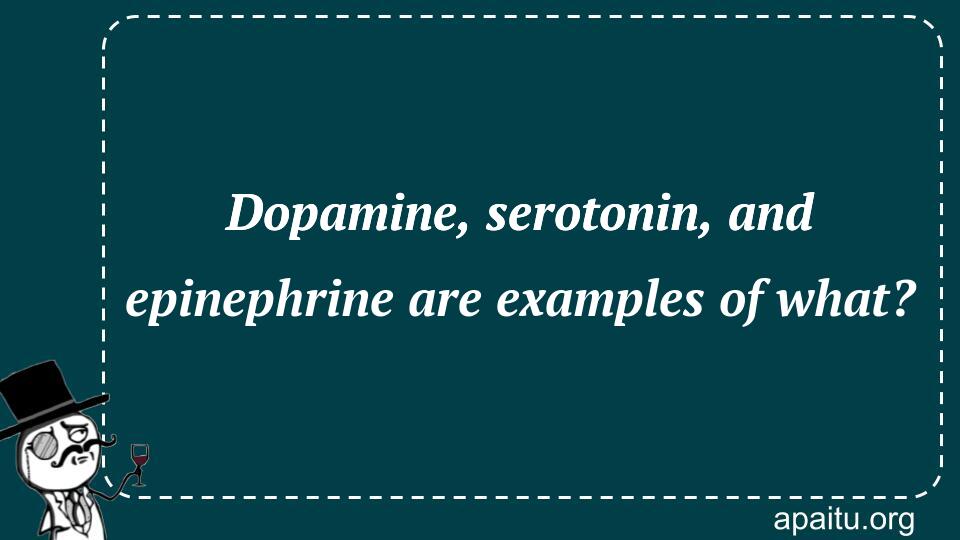Question
Here is the question : DOPAMINE, SEROTONIN, AND EPINEPHRINE ARE EXAMPLES OF WHAT?
Option
Here is the option for the question :
- Drugs
- Axons
- Neurotransmitters
- Neural suppressants
The Answer:
And, the answer for the the question is :
Explanation:
Chemical messengers known as neurotransmitters play an important part in the spread of information throughout the body. Dopamine makes it possible for us to experience pleasure and excitement, and it also enables us to maintain focus. Serotonin is an inhibitor that has a role in regulating mood as well as sleep cycles. In times of high stress, the body releases epinephrine, commonly known as adrenaline, which causes an increase in the volume of blood that is pumped throughout the body.

Neurotransmitters are chemical messengers that transmit signals between neurons in the nervous system. They play a crucial role in many physiological processes, including mood regulation, motor control, and cognitive function. Dopamine, serotonin, and epinephrine are examples of neurotransmitters.
Dopamine is a neurotransmitter that is involved in a variety of functions, including movement, reward, and motivation. It is released in response to pleasurable experiences, such as eating or having sex, and is implicated in addiction and drug abuse. Dopamine is also involved in movement disorders, such as Parkinson’s disease.
Serotonin is a neurotransmitter that is involved in regulating mood, appetite, and sleep. It is implicated in depression and anxiety disorders, as well as in the regulation of pain and aggression. Serotonin is also involved in the regulation of gastrointestinal function, and drugs that target the serotonin system are used to treat conditions such as irritable bowel syndrome.
Epinephrine, also known as adrenaline, is a neurotransmitter and hormone that is released in response to stress or danger. It prepares the body for “fight or flight” by increasing heart rate, blood pressure, and respiration. It is also involved in the regulation of glucose metabolism and the dilation of the pupils.
Other examples of neurotransmitters include acetylcholine, which is involved in muscle control and memory, and gamma-aminobutyric acid (GABA), which is involved in the regulation of anxiety and sleep.
Dysfunction in neurotransmitter systems is implicated in a variety of neurological and psychiatric disorders. For example, a deficiency in dopamine is implicated in Parkinson’s disease, while an excess of dopamine is implicated in schizophrenia. Serotonin dysfunction is implicated in depression and anxiety disorders, while GABA dysfunction is implicated in anxiety disorders and epilepsy.
neurotransmitters are chemical messengers that transmit signals between neurons in the nervous system. Dopamine, serotonin, and epinephrine are examples of neurotransmitters that are involved in a variety of physiological processes, including mood regulation, movement, and stress response. Dysfunction in neurotransmitter systems is implicated in a variety of neurological and psychiatric disorders, highlighting the importance of understanding these systems in order to develop effective treatments for these conditions.